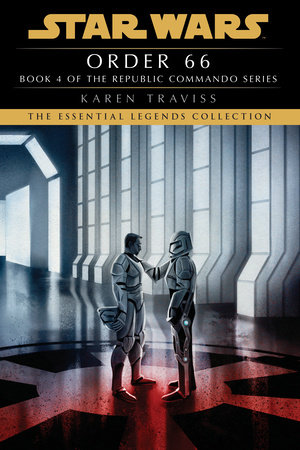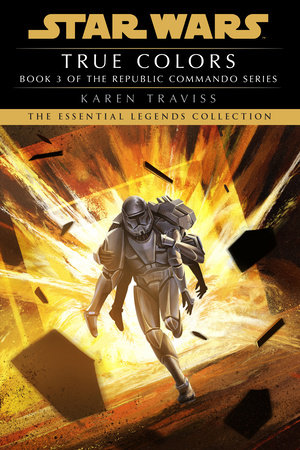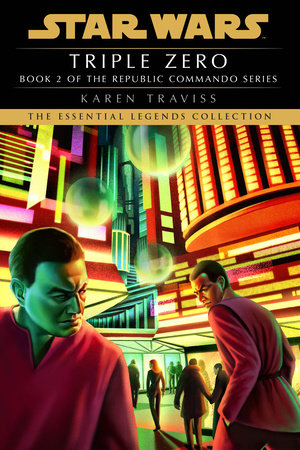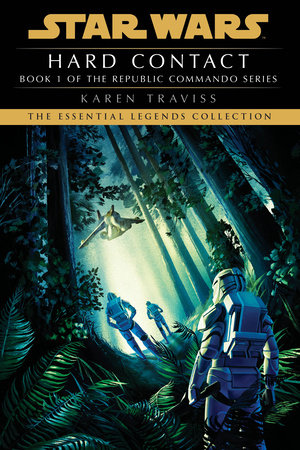Excerpt
Order 66: Star Wars Legends (Republic Commando)
1 So, who’s to know whether Jango had more than one son or not, or even how old he is? Come on now, Spar, it’s time to be doing your bit for Manda’yaim. You don’t have to lift a finger. Just act like Fett’s heir while we sort ourselves out, so everyone knows we’re still in business.
—Fenn Shysa, appealing to deserter Spar—former ARC trooper A-02—to pass himself off as Jango Fett’s son and heir in the interregnum following Fett’s death
Mes Cavoli, Mid Rim, fifty years before the Battle of Geonosis
“Get up! Get up and run, you little chakaar, or I’ll drag you up.”
Falin Mattran could see the curling smoke of the mercenaries’ camp a couple of hundred meters away, but it might as well have been a hundred kilometers. He couldn’t get up: he couldn’t go on. He knelt on all fours, struggling for breath, every muscle burning, but he refused to cry.
He was seven years old. Nearly. He thought it was six years and ten months, but he’d lost count in the war.
“Can’t,” he said.
“Can.” Munin Skirata was a big man with pockmarked green armor and a blaster that fired metal pellets. He loomed above, voice deafening, face invisible behind a helmet with a T-shaped visor that scared Falin the first time he saw it. “I know you can. You survived Surcaris on your own. And you’re not strolling in your fancy Kuati park now, so shift your shebs, you lazy little nibral.”
It wasn’t fair; life generally wasn’t. Falin’s parents were dead, and he hated the world. He wasn’t sure if he hated Munin Skirata, but if he could have killed the man right then, he would have. Only exhaustion stopped him. He almost reached for the knife he’d taken from his father’s body when he realized Papa was dead and was never going to wake up however hard he tried to rouse him, but he couldn’t take his weight off both arms without collapsing into the dirt.
“You can do it if you want to,” Munin yelled. “But you don’t want to, and that makes you a nibral. You know what a nibral is? A loser. A waste of space. Deadwood. Get up!”
Falin wanted one thing, and that was to show that he wasn’t lazy or stupid. His dad had never called him stupid. Neither had his mother; they loved him and made him feel safe, and now they were gone forever. He struggled into a kneeling position, then stood up, swaying and tottering, before breaking into a run again.
“That’s more like it.” Munin jogged alongside him. “Come on. Shift it.”
Falin’s legs didn’t feel like part of his body anymore. He’d run so far that they wouldn’t do what he wanted; he was trying to run, but stumbling along in small steps, unable to find a steady rhythm. His lungs screamed for a rest. But he wasn’t going to stop and be a nibral. He didn’t want to be one of those.
Ahead was as near to home as he was ever going see again, a camp that moved from place to place each day, where he sobbed himself to sleep every night with his fist crammed into his mouth so the Mandalorians wouldn’t hear him and think he was a baby for crying so much.
He could see the Mando soldiers standing around in the camp, watching. They all wore armor. Even their women were tough soldiers, and it wasn’t always easy to tell who was under that armor, male or female—or even if they were human.
Falin willed his body on, but it wasn’t listening. He pitched forward flat on his face.
Every time he tried to get up, gravel and dirt cutting into his palms, his arms gave way again. He sobbed in frustration. The finish line was still a long way off. But he had to get up. He had to finish.
I’m not lazy. I’m not a nibral. I won’t let him call me that—
“Okay, ad’ika,” Munin said, scooping him up in his arms. He sat Falin on one hip as if he was used to carrying kids and strode into the camp. The sudden switch from yelling to kindness was confusing. “You did okay, lad. It’s all right.”
Falin hit Munin as hard as he could, but his balled fist bounced off the metal breastplate. It hurt. He wasn’t going to let Munin know that, though. “I hate you,” he said, now certain at last. “When I’m bigger, I’m going to kill you.”
“I bet you would,” Munin said, smiling. “You already tried once.”
The other Mandalorians watched, some with helmets on, some not. They’d finished fighting their war here. They were waiting for a ship to take them home.
“You trying to kill that boy?” One of the men stopped to ruffle Falin’s hair. His name was Jun Hokan, and he was eating shavings of that horrible dried fish stuff, gihaal, carving them from a big chunk with his vibroblade and popping them into this mouth the way some folks ate fruit. “Poor shab’ika. Hasn’t he been through enough?”
“I’m just training him.”
“There’s such a thing as too much.”
“Come on, he’s mandokarla. He’s already managed to survive on his own. He’s all guts, this one.”
“Guts or not, I didn’t have my boy do proper training runs until he was eight.”
Falin didn’t like being talked about as if he couldn’t understand what was going on. In the center of the camp—tents made of plastoid sheets strung over pits, then covered with grass and branches—a pot of stew was cooking over a crackling fire. Munin set him down and scrubbed his face and hands clean with a cold wet rag before ladling stew into a bowl and handing it to him.
“We’ll have to get you some armor when we get home,” Munin said. “You need to learn to live and fight in it. Beskar’gam. The Mandalorian’s second skin.”
Falin slurped from the bowl. He was always hungry. The stew was more like a broth—no lovely fat dumplings like his mother made—and he didn’t like the fishy smell, but this was a banquet compared with what he’d scavenged in the ruined city for a year.
“Don’t want any armor,” he said.
“You can do all kinds of things when you’re wearing armor that ordinary folks can’t do, Kal.”
Munin called him Kal. In the man’s own language, it had something to do with knives and stabbing. Munin had nicknamed him Kal because Falin had tried to stab him with the three-sided knife when they first met; the Mandalorian seemed to think it was funny, and hadn’t been angry at all. But Munin fed him, and didn’t hurt him, and in the weeks since Falin had been part of the mercenary camp, he’d felt better even if he wasn’t happy.
Sometimes Munin called him Kal’ika. The mercenaries told him it meant “little blade,” and showed that Munin was fond of him.
“I’m Falin,” he said at last. “My name’s Falin.” But he was already forgetting who Falin was. His home in Kuat City seemed like a dream mostly forgotten when he woke up, more a feeling than a memory. His family had moved to Surcaris while his father did engineering stuff on the new KDY warships there. “I don’t want another name.”
Munin ate with him. When he wasn’t shouting, he was actually a kind man, but he could never take Papa’s place. “Starting over can be a good thing, Kal’ika. You can’t change the past or other folks, but you can always change yourself, and that changes your future.”
The thought grabbed Falin and wouldn’t let go. When you felt powerless, the idea of being able to make the bad stuff stop was the best thing in the world, and he didn’t want to feel this bad ever again. He wanted things to change.







